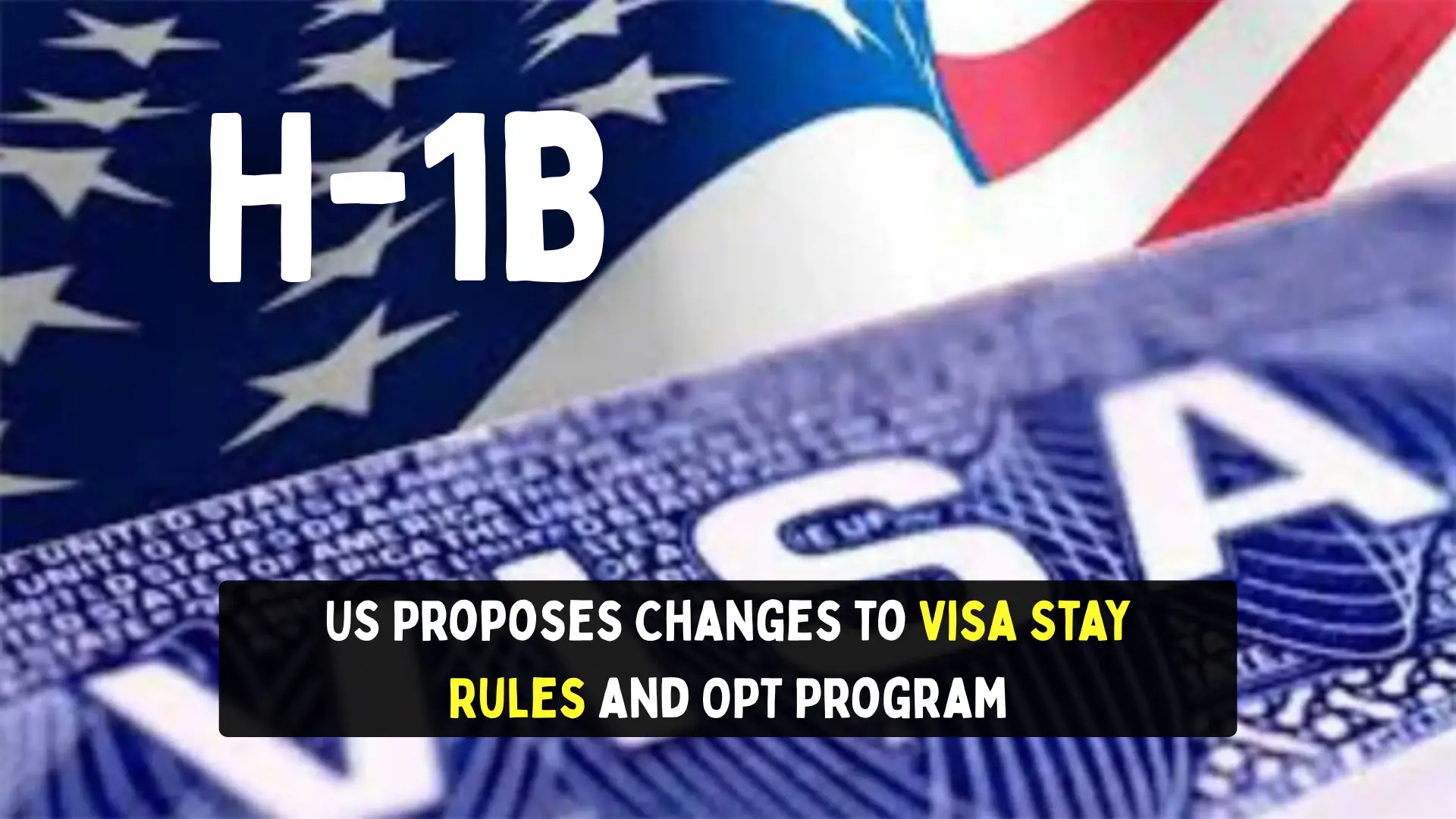US Proposes Changes to Visa Stay Rules and OPT Program. If you’re an international student or planning to study in the US, you should pay close attention. The U.S. Department of Homeland Security (DHS) has proposed major changes to visa-stay rules for F, J and I visa holders.
At the same time, there are also worrying signals for the Optional Practical Training (OPT) program — especially with possible taxes on OPT earnings. These reforms may reshape how long you can stay, work and what you’ll pay if you study in the US.
What Are the Proposed Visa Stay Rule Changes?
Fixed Time Period Instead of “Duration of Status”
Currently, many international students with F, J or I visas are admitted under “Duration of Status” (D/S) — meaning they can stay as long as they meet requirements like being enrolled, etc. The DHS proposes to change this so that you are admitted for a fixed period of stay instead. Key proposed rule changes:
- For F-1 and J-1 visa holders, instead of D/S they would have a fixed date of authorized stay (e.g., the end date of program) plus a short grace period.
- A cap of up to 4 years for stay for many F and J students is proposed.
- The post-completion grace period (time after your program ends) would be shortened from 60 days to 30 days in some cases.
- More restrictions on changing schools, study levels or majors during the initial period are also proposed.
Why Is This Important?
These changes mean less flexibility. Suppose you plan to stay longer, switch schools or pursue further degrees. In that case, you’ll likely need to officially apply for an Extension of Stay (EOS) through U.S. Citizenship and Immigration Services (USCIS) rather than simply maintaining status. Also, the proposed rule means if you stay past your permitted fixed date without approval, you may begin accruing “unlawful presence” sooner than under the D/S system.
OPT Program Under Threat? What You Should Know
What is OPT?
OPT (Optional Practical Training) allows F-1 visa students to gain work experience in the US for up to 12 months (or 24 months for STEM-eligible) after completing a degree.
Tax Changes Being Proposed
The article by Shweta Kukreti mentions a possible change by Tom Cotton in the “OPT Fair Tax Act,” which would require both students on OPT and their employers to pay Social Security (FICA) taxes (currently OPT students are exempt). If passed, this would mean:
- Employers hiring OPT students would have to match contributions.
- Students could lose roughly 15 % of their take-home salary (6.2 % + 1.45 % from employee + matching from employer) if rule applies.
- This may make the OPT route less attractive for both employers and students.
Impact on International Students
These tax changes and visa stay reforms together create a “dual threat” for international students — less time, more cost, more hurdles. According to official data, foreign student enrolment in the US in August dropped by 19 % compared with the previous year, and enrolment from India decreased by 45 %.
Some projections suggest enrolment may fall by over 50 % in autumn 2025 if the conditions worsen for international students.
Summary of Key Proposed Changes
| Area | Current Rule | Proposed Change |
|---|---|---|
| Admission stay for F/J/I | “Duration of Status” (D/S) – as long as maintaining status | Fixed admission period (up to ~4 years) + short grace period of ~30 days |
| Grace period after program/OPT | 60 days (for many F-1) | 30 days (in many cases) |
| Changing schools/majors | More flexibility | Restrictive: e.g., undergraduate cannot change during first year, graduate must remain in same program |
| OPT tax exemption | OPT students + employers exempt from FICA (Social Security + Medicare) | OPT Fair Tax Act proposes eliminating exemption (students + employers to pay) |
How Will These Changes Affect You?
If You Are a Current or Prospective International Student
- Plan program length carefully. If the limit becomes 4 years, make sure your study plan fits.
- Monitor your stay period. If a fixed date is issued, staying beyond that without extension could create issues (unlawful presence).
- Consider OPT costs. If tax changes pass, your effective earnings after completing your degree may drop.
- Re-evaluate US as destination. With rising cost & reduced flexibility, some students may choose other countries.
If You Are an Employer Hiring OPT Students
- Budget for new costs. If employers must pay matching contributions, the cost of hiring OPT students may rise.
- Review hiring strategy. You may weigh the benefit of hiring an OPT student against higher costs or uncertainty.
For Universities & Institutions
- Advising needs change. Student services must adjust to shorter stay periods, more reporting, potentially more transfers.
- Recruitment impact. With these changes, attracting international students may become harder; enrolments could drop.
What’s Next & When Will These Changes Happen?
- The DHS published its notice of proposed rulemaking on August 28, 2025.
- The public comment period ended for some items (e.g., comments due Sept 29, 2025) but final rule not yet published.
- Because it is still a “proposed rule”, the final outcome could change based on feedback.
- The tax changes for OPT (OPT Fair Tax Act) are still in legislative stages — not yet law.
- It is wise to stay updated via your university’s international student office or immigration attorney.
Why These Changes Are Being Proposed
- Enhanced oversight: DHS says fixed stay periods improve its ability to monitor non-immigrants.
- Reduce fraud/abuse: Critics say the D/S system allowed some to overstay or misuse status.
- Tax fairness: The OPT tax exemption has been viewed as a “discount” on foreign student labour.
- Changing global dynamics: With foreign student numbers falling, the US may want to tighten rules.
Conclusion
If you are an international student or planning to study/work in the US under F, J or I status — or plan to go into OPT, these proposed changes matter now. They could reduce your stay, raise your costs, and create more administrative hurdles.
FAQs
1. Will these changes apply to students already in the US?
The proposed rule includes transition provisions. Many current F/J visa holders may remain under older rules, but if they travel abroad and re-enter, new fixed stay rules might apply.
2. Does the OPT tax change mean I will definitely pay FICA?
Not yet. The OPT Fair Tax Act is proposed legislation. Until it becomes law and is implemented, OPT students remain exempt. But you should budget for a change.
3. How much could international student enrolment drop?
According to reports, enrolment already dropped ~19 % in August year-on-year, and projections suggest over 50 % drop in autumn 2025.
4. What if I stay beyond the fixed admission period without applying for extension?
You risk accruing “unlawful presence,” which can affect future visa or immigration benefits.
5. Can I still change schools or majors under the new proposed rule?
There will be tighter restrictions: undergrad students may not change in first academic year; graduate students may be prohibited from changing programs.

















